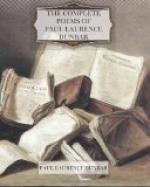In fact from every part of Ohio and from several cities of the adjoining States, there came letters in cordial appreciation of the critical recognition which it was my pleasure no less than my duty to offer Paul Dunbar’s work in another place. It seemed to me a happy omen for him that so many people who had known him, or known of him, were glad of a stranger’s good word; and it was gratifying to see that at home he was esteemed for the things he had done rather than because as the son of negro slaves he had done them. If a prophet is often without honor in his own country, it surely is nothing against him when he has it. In this case it deprived me of the glory of a discoverer; but that is sometimes a barren joy, and I am always willing to forego it.
What struck me in reading Mr. Dunbar’s poetry was what had already struck his friends in Ohio and Indiana, in Kentucky and Illinois. They had felt, as I felt, that however gifted his race had proven itself in music, in oratory, in several of the other arts, here was the first instance of an American negro who had evinced innate distinction in literature. In my criticism of his book I had alleged Dumas in France, and I had forgetfully failed to allege the far greater Pushkin in Russia; but these were both mulattoes, who might have been supposed to derive their qualities from white blood vastly more artistic than ours, and who were the creatures of an environment more favorable to their literary development. So far as I could remember, Paul Dunbar was the only man of pure African blood and of American civilization to feel the negro life aesthetically and express it lyrically. It seemed to me that this had come to its most modern consciousness in him, and that his brilliant and unique achievement was to have studied the American negro objectively, and to have represented him as he found him to be, with humor, with sympathy, and yet with what the reader must instinctively feel to be entire truthfulness. I said that a race which had come to this effect in any member of it, had attained civilization in him, and I permitted




